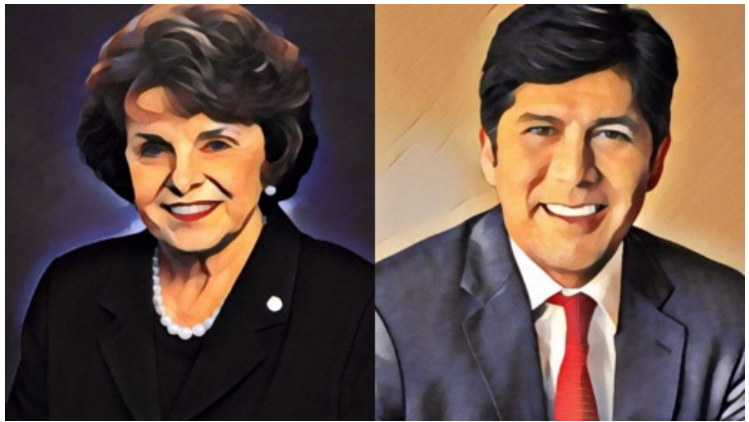CommentsCAL MATTERS--What’s the sound of one man debating? California voters got an idea today at the first and only scheduled candidate forum in the 2018 U.S. Senate race.
State Sen. Kevin de León may have debated Sen. Dianne Feinstein at the Public Policy Institute of California’s downtown San Francisco office this afternoon, but Feinstein wasn’t interested in debating him.
De León, the former president pro tempore of the state senate who is nonetheless not well known by many voters, did his best to distinguish himself from California’s long-time sitting senator, criticizing her as a representative of a “status quo” that “keeps resisting the resistance.”
“I wish Democrats in Washington would fight like hell for Dreamers just the way that Donald J. Trump and the Republicans fight like hell for their stupid wall,” he told the institute’s president, Mark Baldassare, in a not so veiled dig at his opponent across the stage. “That lack of courage, always backpedaling every single time, is not the type of leadership that we need today.”
Feinstein largely focused on her record as a four-plus term senator for California, speaking about her policy proposals, while largely declining to engage her opponent. When she did acknowledge de León, it was generally to agree with him.
The divergent approaches to the “conversation,” as it was billed, were in part a result of the format. Rather than the response/counter-response structure of more traditional campaign debates, this was a mediated discussion between the two candidates. This made for a fairly staid and largely amicable hour of policy discussion. That certainly favors Feinstein, who leads in the polls and name recognition. De León, meanwhile, was hoping to change the nature of the race by tarnishing Feinstein’s brand and making a splash with new voters.
On policy matters, the two candidates disagreed on relatively little.
They shared the view, for example, that sexual assault allegations against Justice Brett Kavanaugh should be revisited. They agreed that children should no longer be separated at the border and that immigration reform is long overdue. They both oppose the twin Delta tunnels water project and support more gun control.
When de León tried to make a point that Democrats in Washington (including Feinstein) let voters down by failing to renew the federal ban on so-called assault weapons when they controlled Congress in 2009, the senior senator did not take the bait.
“I don’t think we disagree on this,” she said. “I think we agree.”
“We can move on then, unless…?” said Baldassare, looking at Feinstein. She said nothing and they moved on.
Likewise, when de León laid the blame for the Iraq War on Feinstein, who voted to authorize the invasion, or called out her support for the Homeland Security Act, which authorized Immigration and Customs Enforcement (ICE), Feinstein let the comments slide.
That the policy preferences of the two candidates overlap so much is hardly surprising. They’re both Democrats. Under California’s “top two” electoral system, the first and second place winners in the primary move onto the general election, regardless of party. On June 5th, Feinstein won 44 percent of the vote, while de León won 12 percent. The remainder was split across 30 other candidates.
But the two candidates did part ways on two issues: health care reform and the impeachment of President Trump.
Feinstein said that she supports a public option health insurance program for individuals to buy into, reducing the age for Medicare eligibility, allowing Medicare to negotiate for lower prescription drug prices, and increasing health insurance subsidies under the Affordable Care Act.
De León supports expanding Medicare to everyone, brushing off criticisms that such a program is unaffordable.
“Washington always seems to find the money for its priorities: two wars in Iraq and Afghanistan…tax cuts for the rich,” he said.
In the closest thing to a direct exchange, Feinstein argued that Democratic numbers in the Senate precluded the possibility of removing the president from office.
“What changes things are elections,” she said. But de León was not convinced by the arithmetic.
“We need Democrats in Washington D.C. to have the courage of their convictions…regardless of what the makeup is of the House as well as the U.S. Senate,” he said toward the end of the event.
One area in which de León held his fire was the confirmation hearings of Supreme Court Justice Brett Kavanaugh. Though he had been sharply critical of Feinstein’s handling of the sexual assault allegations by Palo Alto psychology professor Christine Blasey Ford during the hearings, he dropped that tactic.
Today’s low-profile sit down echoes last week’s gubernatorial debate, when Lt. Gov. Gavin Newsom squared off with his Republican opponent John Cox in a mid-morning radio appearance. That too was the one and only candidate forum scheduled during the general election, held at a definitively non-prime time hour, eliciting complaints from the underdog. Cox has clamored for additional, higher profile debates. Likewise, de León has questioned whether the PPIC event even meets the definition.
“Hardworking Californians, people who work two, three jobs can’t take off in the middle of the day to turn on a livestream and watch this conversation,” a campaign spokesman said last week.
De León faces long odds in toppling Feinstein. Even so, that the event took place at all suggests that this race represents an unusually strong challenge to California’s senior U.S. senator. Feinstein hasn’t gone head-to-head with an electoral opponent—whether in debate or mere “conversation”—since 2000. De León was sure to remind the audience of that point.
“I think the last time Senator Feinstein had an opponent on the same stage was about 18 years ago,” he said, turning to his opponent. “So this is historic and I want to thank you very much for this opportunity to be here with you today.”
(Ben Christopher writes for CalMatters … where this piece was first posted.)
-cw
















